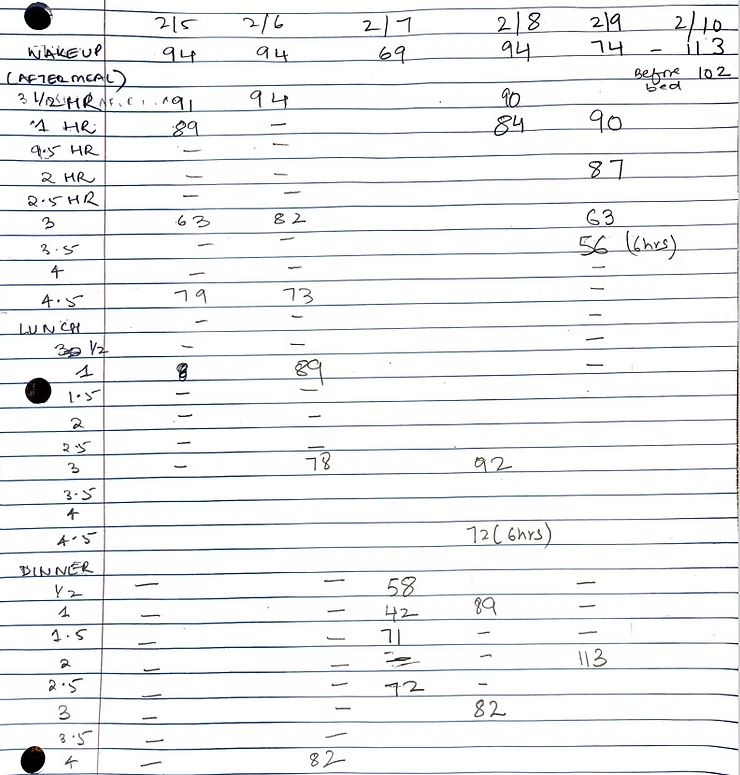Recognize early warning signs like shakiness, confusion, sweating, and a rapid heartbeat to help identify when blood sugar is dropping.
Hello, friends! Imagine feeling so angry and out of sorts that your mood swings could knock over a lamp! Some people call this feeling being “hangry,” but it’s often a sign of something called reactive hypoglycemia, which means your blood sugar is too low. It’s like your body’s fuel tank is empty, and everything starts going a bit haywire.

https://www.youtube.com/watch?v=GQ0hNIpgEOg See reference The Importance of Labs: Deciphering the Results To gain a deeper understanding of how your body functions...
Years of Experience
I understand the fear and exhaustion of living with hypoglycemia—waking up unsure if you’ll face dizziness, weakness, or sudden drops in energy that others often dismiss. Many of my patients have been to doctor after doctor, told their labs are ‘normal,’ or that it’s all in their head—yet they still struggle. Through lab-guided Functional Medicine, we uncover the hidden root causes of blood sugar instability and create personalized solutions that help the body heal naturally.”

Certified Functional Medicine Clinician

Trustindex verifies that the original source of the review is Google. I spent 10 years trapped in excruciating pain and fatigue after a severe reaction to the antibiotic Levaquin—ruptured Achilles tendons, constant inflammation, and even the lightest touch of fabric felt crushing. A simple cotton button-up shirt felt like a weighted vest that left me breathless, and the shoulder harness of a seat belt was unbearable. Multiple specialists dismissed me or offered quick-fix pills that only made things worse. Then I found Dr. Hugh Wegwerth. From our first call, Dr. Hugh listened, tested, and built a slow, step-by-step plan I could trust. His “Magic Trio” of magnesium glycinate, high-quality fish oil, and caprylic acid stopped the relentless foot-sweating and healed open wounds within a month. Layered with targeted supplements, neurological exercises, and an anti-inflammatory diet (coached at my pace, never pressured), the improvements snowballed: Pain down 95 %—I bend, lift, and wear most of my wardrobe again. Clothing tolerance back—that same cotton shirt no longer steals my breath, and I can buckle up without holding the seat belt away from my body. Energy up—running after my backyard chickens no longer floors me for days. Regular periods for the first time in 20 + years—I’m completely off birth control. Hiking 2–3 times a week and even doing jumping exercises that were unthinkable before. Driving freedom—short rides that once left me exhausted are now two-hour traffic trips without suffering. Confidence returned—friends and family notice my clear skin, bright eyes, and genuine smile. I’m not perfect yet—I still watch my diet closely and stay disciplined with Dr. Hugh’s routine—but the results are 100 % worth it. His patience, empathy, and deep functional-medicine knowledge turned a decade of hopelessness into real, measurable progress. If you’ve been “floxed” or are battling a chronic mystery illness, don’t give up—call Dr. Hugh. I only wish I’d found him soonerPosted onTrustindex verifies that the original source of the review is Google. So grateful for Dr. Hugh!!!! He has helped me recover from being floxxed when no other doctor knew what to do. Almost 100% recovered and I finally have my life back 🙏Posted onTrustindex verifies that the original source of the review is Google. ⭐️⭐️⭐️⭐️⭐️ Dr. Hugh Wegwerth is very kind and listens to you. He takes the time to really understand your health and doesn’t just give you a quick fix. He helps you find the root cause of your problem and gives advice that works. I recommend Dr. Wegwerth to anyone who wants a real answer to their health problems!Posted onTrustindex verifies that the original source of the review is Google. My names Luke, Dr Hugh Wegwerth not only has a ton of knowledge but has helped me tremendously. He understands biology/biochemistry which is critical for healing from cipro damage. Thank you for your help.Posted onTrustindex verifies that the original source of the review is Google. Dr.Hugh helped me improve my blood pressure by making a simple but overlooked suggestion to my current protocol. He also gave me a much needed reality check that renewed my commitment to do the exercises for dysautonomia. It’s very evident that he cares about his clients and gives 100% to help improve your situation. Thanks Dr. Hugh!Posted onTrustindex verifies that the original source of the review is Google. I'm incredibly grateful to Dr. Hugh for his help after I was damaged by fluoroquinolones. I've been working with him for a few weeks, following his protocols, including a carnivore diet, using the machine, and taking the recommended minerals. The improvement has been remarkable! My joint pain, especially in my Achilles tendon, has significantly reduced, and I'm experiencing fewer muscle cramps and twitches. I also noticed a big improvement in my circulation. I used to wake up with my arms feeling numb, but that issue has completely disappeared. My digestion has also become more regular, which is a huge relief. Dr. Hugh has been amazing in helping me on my road to recovery. Highly recommend him to anyone dealing with similar issues!Posted onTrustindex verifies that the original source of the review is Google. I watched Dr Hugh for 3 years before I actually called for an appointment. I have RA and fibromyalgia, but the final straw was Long Covid. He gave me insight into things I had no idea we’re wrong in my life and helped me correct my habits. Thank you for your service Dr Hugh!Posted onTrustindex verifies that the original source of the review is Google. Tremendous Improvement Under Dr. Hugh Wegwerth's Care I cannot express enough gratitude towards Dr. Hugh Wegwerth for the outstanding care and attention he has given to my case. His commitment and empathy have made a monumental difference in my health and overall well-being. The transformation in my mobility has been truly significant. I've noticed marked improvement in my walking, with my feet no longer shuffling but rather lifting off the floor. On better days, the necessity of a cane has become obsolete, which is an immense step forward. Moreover, the quality of my sleep has greatly improved under Dr. Wegwerth's care. The ensuing boost in my energy levels has made me feel more vibrant and alive than ever before. There's nothing quite like waking up refreshed and rejuvenated each morning. Another notable improvement has been in the condition of my skin. Thanks to Dr. Wegwerth's treatments, it's healthier, less itchy, and noticeably improved. This progress brings me immense joy and contributes to my overall happiness. Interestingly, I've found myself able to stay up later, needing less sleep than before. This, combined with the decrease in my night sweats, has significantly improved my daily living. Even issues with my previously cold hands and feet have shown about a 20% improvement, which is truly comforting. For anyone out there grappling with similar health issues, I wholeheartedly recommend Dr. Hugh Wegwerth. His professional expertise, combined with genuine care and concern, has profoundly enhanced my life. A heartfelt thank you to Dr. Wegwerth for all the positive changes he has inspired in my life.Posted onTrustindex verifies that the original source of the review is Google. In Oct. of 2021, I was floxed with Levaquin and Dexamethozone. And went on a HORRIBLE journey of psychosis and hospitals. My husband is a researcher and found Dr. Wegwerth online and we started watching his videos and it all made sense. I finally started working with him in October of 2022 and as of today I am MUCH better. He got my husband and I started on a path to health like never before. We have since been able to find a wellness doctor in our hometown that is helping us with nutrients and Ozone Treatment. We would not have got going without the boost from Dr. Wegwerth and his extensive testing and advice. We have both lost weight and generally overall just feel better. You won't regret working with Dr. Wegwerth. Thank you again Dr. Hugh!!Posted onTrustindex verifies that the original source of the review is Google. Gets to the root cause and teaches you how to get better. Great use of extensive lab testing and deep knowledge of human nutrition and biochemistry. Helped my husband after flouroquinolone toxicity in days after doctors failed for months. Thank you, Dr. Hugh!!Posted on
Discover how we can help you heal.
Get a tailored approach to your healing.
Experience ongoing support and relief.